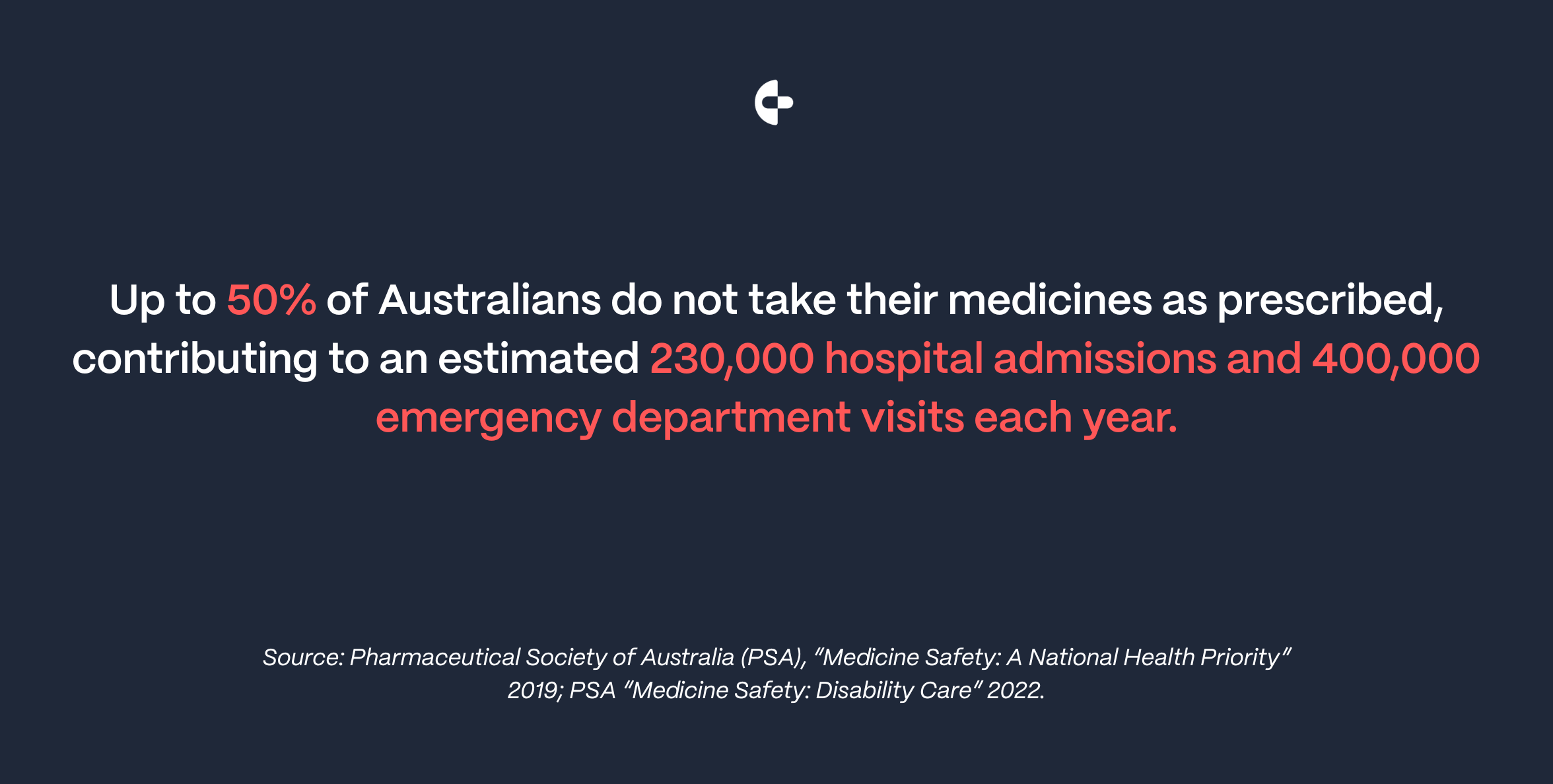Support Workers and Medication Adherence: What the NDIS Expects

Support Workers & Medication Adherence: What the NDIS Expects
Introduction
For many NDIS participants, taking medication safely and consistently is critical to their wellbeing and independence. Yet in practice, medication support is one of the most sensitive and highly regulated areas in disability care. Support workers play a vital role in ensuring adherence, but what exactly does the NDIS expect from providers and their teams?
In this article, we unpack the official requirements, best practices, and how technology such as the Cappsule ecosystem can help support workers deliver medication assistance safely, confidently, and in line with NDIS Practice Standards.
1. Why Medication Adherence Matters
Medication adherence, or taking medicines at the right time, in the right dose, and in the right way, directly impacts a participant’s health outcomes. Missed doses can lead to deterioration in health, behavioural changes, hospitalisation, or even life-threatening incidents.
Under the NDIS Quality and Safeguards Commission, medication support must prioritise the participant’s dignity, choice, and independence while ensuring safety. It is not just about handing over a pill; it is about creating a structured, person-centred process that reduces risk and promotes autonomy.

2. Understanding NDIS Requirements for Support Workers
The NDIS Practice Standards include a specific ‘Provision of Supports – Medication Management’ module.
Support workers must follow these key principles:
a. Clear Authorisation
Support workers should only assist with medication when they are:
- Authorised by the participant’s plan or service agreement.
- Properly trained and competent for the specific medications involved.
- Working under written policies and procedures set by their provider.
Each service must have a Medication Authorisation Form or equivalent documentation outlining:
- What medications are administered.
- The dose and schedule.
- Who is authorised to give them.
- How they are stored and recorded.
b. Competency and Training
Support workers must be trained in:
- Safe medication handling and hygiene.
- Identifying side effects or reactions.
- Documentation and reporting.
- Understanding the scope of their role (for example, assistance versus administration).
Refresher training is typically required every 12 months, especially where workers assist with high-risk medications such as insulin or antiepileptic drugs.
c. Record-Keeping and Reporting
The NDIS Commission mandates accurate medication administration records (MARs).
Support workers must record every dose given or refused, including:
- Date and time.
- Medication name and dosage.
- Method of administration.
- Any missed dose or participant refusal.
- Their name and signature.
Any errors, omissions, or incidents such as a missed dose, wrong dose, or allergic reaction must be reported immediately to the provider and, if serious, to the NDIS Commission.
d. Participant Rights
Support workers should respect:
- The participant’s right to refuse medication.
- Privacy and dignity during administration.
- The participant’s choice of how supports are delivered, for example, self-administration with supervision versus full assistance.
“The use of medication should be the least intrusive option possible and always delivered in accordance with best practice and the participant’s care plan.” — NDIS Quality and Safeguards Commission, Medication Management Guidelines.
3. Common Challenges Support Workers Face
Medication support can be complex, especially across multiple participants, medications, and routines. Common issues include:
- Unclear documentation such as outdated care plans or illegible medication charts.
- Inconsistent routines leading to missed or duplicated doses.
- Human error from fatigue, distractions, or lack of verification.
- Limited visibility when multiple support workers share shifts or when family administers doses outside support hours.
- Communication gaps between pharmacies, GPs, coordinators, and disability providers.
These challenges can result in critical incidents or non-compliance with NDIS Practice Standards, areas the Commission has recently intensified audits on.
4. How Technology Enhances Medication Adherence and Compliance
Digital tools are transforming how support workers manage medication adherence, improving both safety and efficiency.
The Cappsule ecosystem integrates smart sensors, BLE-tagged medication packs, and real-time dashboards to ensure accurate tracking and accountability at every step.
Here is how technology supports compliance:
- Automatic time-stamping: Every access of a medication container is logged.
- Real-time alerts: Missed doses trigger notifications to the care team or family.
- Digital records: Replaces manual logs with verifiable digital entries.
- Visibility for coordinators: Supervisors can view adherence data across participants, supporting oversight and audits.
- Training integration: Workers can access digital checklists and reminders for each participant’s care plan.
This not only reduces risk but also helps providers demonstrate compliance during NDIS audits and reviews by showing clear, traceable adherence data.
5. Best-Practice Steps for Support Workers
To meet NDIS expectations and maintain participant safety, support workers should:
- Check the participant’s medication plan before every shift.
- Verify the “five rights” — right person, right medication, right dose, right time, right route.
- Document immediately after assistance or administration.
- Communicate any changes such as new medications, missed doses, or refusals promptly.
- Store medication safely and follow temperature and security requirements.
- Review your training and ensure competency certificates are current.
- Encourage independence where safe, supporting the participant to take ownership of their medication routine.
6. Provider Responsibilities
Beyond the support worker’s actions, NDIS providers must:
- Develop and maintain written medication policies and procedures aligned with the NDIS Practice Standards.
- Ensure staff training and competency assessment is documented.
- Conduct regular audits and spot-checks on medication records.
- Implement an incident management system for errors or refusals.
- Review participant medication plans regularly, particularly when health or medications change.
Providers that use connected adherence systems like Cappsule can automate parts of this process, reducing manual errors, providing real-time oversight, and improving audit readiness.
7. The Path Forward: Safer, Smarter Support
Medication adherence is a shared responsibility between participants, families, support workers, and providers.
As the NDIS continues to tighten compliance expectations, digital health tools like Cappsule provide the bridge between human care and data-driven safety.
By embracing connected adherence technology, providers can:
- Reduce medication incidents.
- Empower workers with clarity and confidence.
- Provide transparent adherence data to coordinators and auditors.
- Strengthen trust with participants and families.
Supporting independence does not mean stepping back. It means stepping up with the right information, tools, and accountability.
Conclusion
Support workers are the backbone of medication adherence in NDIS care. By combining clear training, robust documentation, and digital support through platforms like Cappsule, providers can meet and exceed the NDIS’s expectations.
Medication safety is not just about compliance; it is about empowerment, dignity, and continuity of care.
Want to see how Cappsule’s adherence dashboard helps providers and support workers meet NDIS medication-management standards?
Contact us for a demo or implementation guide tailored to your organisation.







.png)